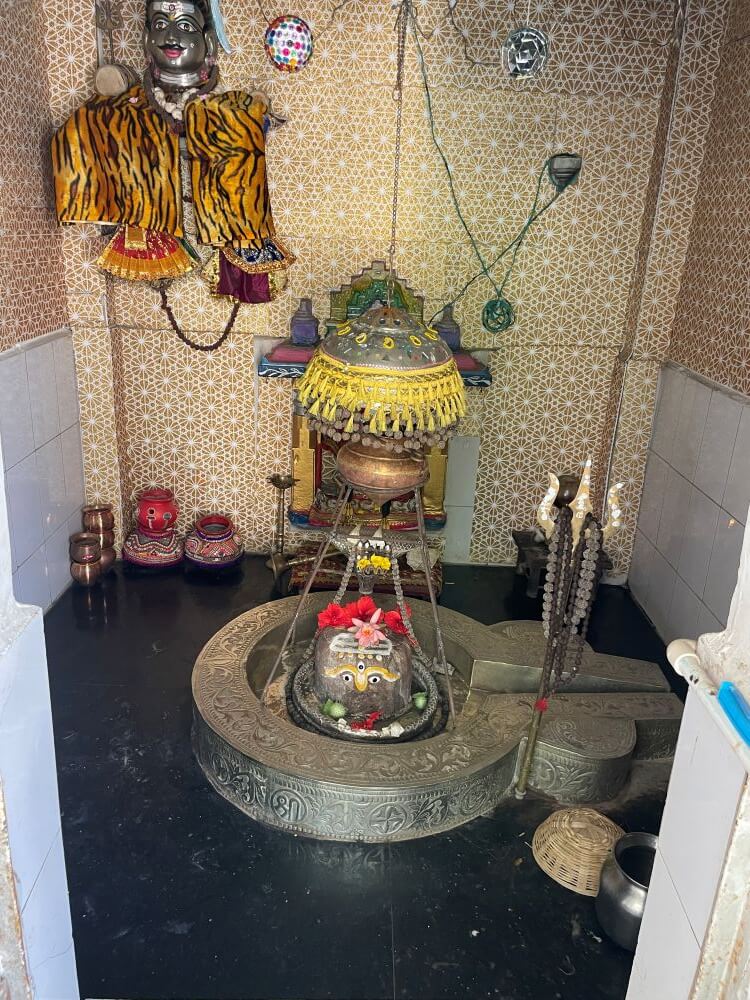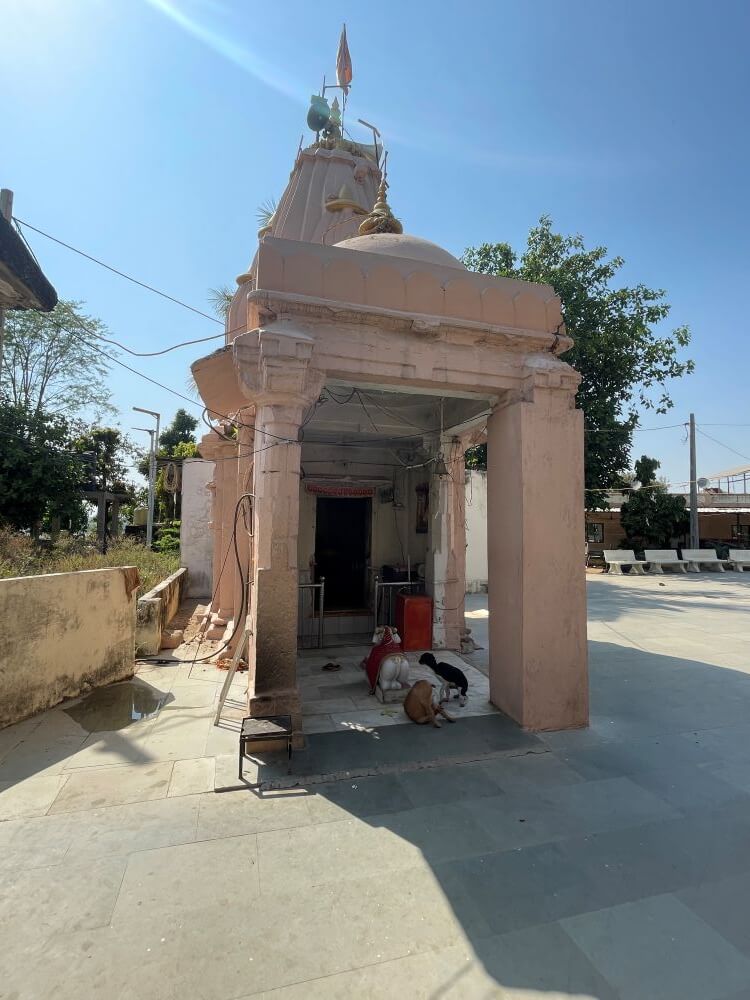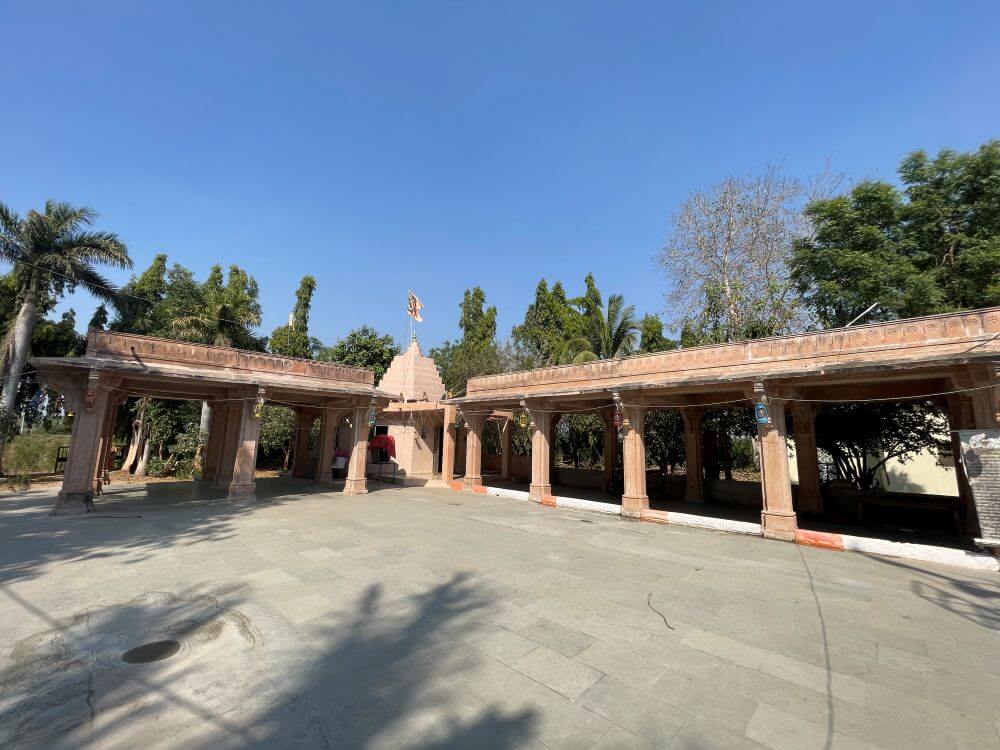

Located in Tilakwada (District Narmada), Maninageshwar Temple is an important pilgrimage site on the Uttarvahini Narmada Parikrama. This ancient temple, where Maninag, the son of Sage Kashyap, worshipped Lord Shiv, is mentioned in both the Narmada Purana and Ramcharitmanas. Situated amidst natural beauty on the banks of the Narmada river, this sacred site offers the divine darshan of three-eyed Lord Shiv (Trinetradhari Shankar). Among several temples of historical and mythological significance in Tilakwada, Maninageshwar Temple attracts thousands of devotees and pilgrims performing the Narmada Parikrama.
According to legend associated with this temple, Kadru and Vinata, daughters of Daksha Prajapati, were wives of Sage Kashyap. Kadru became the mother of serpents (Nagas) and Vinata became the mother of birds, named Arun and Garud. A dispute arose between them regarding the color of Uchchaihshrava, the divine white horse obtained during the churning of the ocean. Vinata claimed the horse was white, while Kadru argued it was black. Kadru proposed a wager regarding the horse’s color, stating that if she lost, she would have to accept servitude.
To win, Kadru ordered her thousand serpent sons to coil around the horse to make it appear black.  All but Maninag obeyed. He refused and Kadru disowned him. With the deception successful, Kadru won and Vinata was forced into servitude. Saddened by his mother’s enslavement, Garud requested Kadru to release her. She agreed, but only if Garud brought Amrit (nectar of immortality) from heaven. After defeating Indra in battle and obtaining the nectar, Garud returned and placed it before Kadru. However, before consuming it, Indra disguised himself as a Brahmin and instructed the snake sons to bathe in the Narmada River. When all the snakes went to bathe, Indra stole away with the nectar. On returning, the serpents found only dew drops on the grass where the pot was kept. Believing it to be Amrit, they licked the grass blades, but their tongues split due to the sharp edges. Hence snakes have forked tongues.
All but Maninag obeyed. He refused and Kadru disowned him. With the deception successful, Kadru won and Vinata was forced into servitude. Saddened by his mother’s enslavement, Garud requested Kadru to release her. She agreed, but only if Garud brought Amrit (nectar of immortality) from heaven. After defeating Indra in battle and obtaining the nectar, Garud returned and placed it before Kadru. However, before consuming it, Indra disguised himself as a Brahmin and instructed the snake sons to bathe in the Narmada River. When all the snakes went to bathe, Indra stole away with the nectar. On returning, the serpents found only dew drops on the grass where the pot was kept. Believing it to be Amrit, they licked the grass blades, but their tongues split due to the sharp edges. Hence snakes have forked tongues.
Maninag, heartbroken over being abandoned by Kadru, went to the banks of the Narmada River and wept. His tears formed a river called Mena. Eventually, Kadru regretted her actions and accepted Maninag back. However, Maninag refused to go with her and chose to settle permanently at this location. After performing penance here and pleasing Lord Shiva, this place became known as “Maninageshwar.”
Tilakwada, 60 km from Vadodara, was once a significant revenue center of the Baroda State. Along with Maninageshwar Temple, the region features temple of  Gyanmudradhari Maruti (Hanuman), Rameshwar Mahadev Temple (established by Lord Ram en route to exile), Vasudev Kutir (where Vasudevanand Saraswati aka Tembe Swami, the fourth avatar of Dattatreya, spent his eighth Chaturmas), Gautameshwar Mahadev Temple (where Lord Ram invoked the Saptamatrikas to send Ahilya back to Sage Gautam after her redemption), ancient temple of the Saptamatrikas and Tilkeshwar Mahadev Temple (established by Tilak Raja and worshipped with sesame seeds). Pilgrims believe the Narmada Parikrama is incomplete without visiting these temples.
Gyanmudradhari Maruti (Hanuman), Rameshwar Mahadev Temple (established by Lord Ram en route to exile), Vasudev Kutir (where Vasudevanand Saraswati aka Tembe Swami, the fourth avatar of Dattatreya, spent his eighth Chaturmas), Gautameshwar Mahadev Temple (where Lord Ram invoked the Saptamatrikas to send Ahilya back to Sage Gautam after her redemption), ancient temple of the Saptamatrikas and Tilkeshwar Mahadev Temple (established by Tilak Raja and worshipped with sesame seeds). Pilgrims believe the Narmada Parikrama is incomplete without visiting these temples.
Nestled in a serene natural environment, Maninageshwar Temple features a courtyard with a shrine dedicated to Balakrishna on its left side.  This small temple houses an enchanting brass idol of Balakrishna adorned beautifully. Nearby is a shrine for Ganesh with a standing idol of his mouse companion before him. In front of Maninageshwar Temple are two sacrificial pits (yajna kunds). The temple structure includes a hall (sabhamandap), sanctum (antarala), and main shrine (garbhagriha). In front of the sanctum is a white idol of Nandi and a tortoise statue. Inside the sanctum is a Shivling with a serpent canopy above it featuring three eyes. On one wall behind this Shivling is an idol of Goddess Parvati along with a representation of Shiva’s face above.
This small temple houses an enchanting brass idol of Balakrishna adorned beautifully. Nearby is a shrine for Ganesh with a standing idol of his mouse companion before him. In front of Maninageshwar Temple are two sacrificial pits (yajna kunds). The temple structure includes a hall (sabhamandap), sanctum (antarala), and main shrine (garbhagriha). In front of the sanctum is a white idol of Nandi and a tortoise statue. Inside the sanctum is a Shivling with a serpent canopy above it featuring three eyes. On one wall behind this Shivling is an idol of Goddess Parvati along with a representation of Shiva’s face above.
In the Hanuman temple adjacent to this temple, there is a standing idol of Hanuman. In this temple, there is a continuous chanting of Shiv’s name as well as bhajans (devotional songs).



